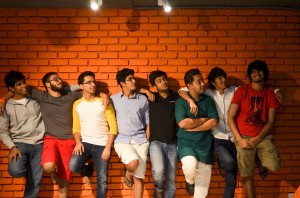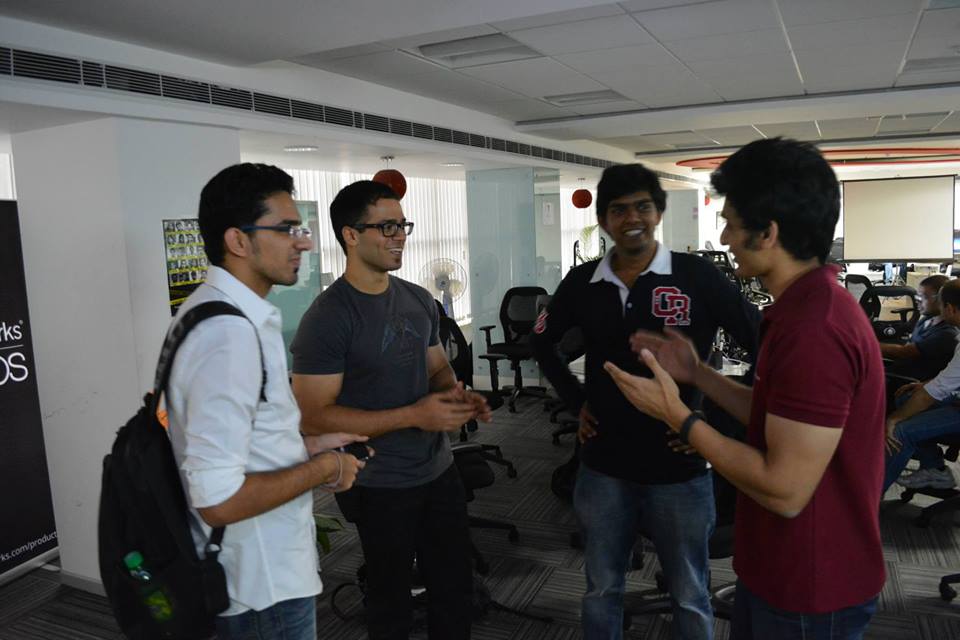
It was July 2014, while every other student in the seventh semester was working on their CV, four students of the computer science engineering students decided to bring their plan into action: to build a recruitment website like many other hiring giants in the market… but better.

The Founders Kartik Luke, Mohak Dhingra, Sandesh Kini and Varun Mayya(left to right in picture) studied at MIT, Manipal, batch of 2015. Varun and Kartik had been working together in their previous venture, Sizr, while working on several other projects of their own.
Things took a turn when Varun presented his interest towards creating a website, that would have an impact nationwide and soon the others were on board with the plan.
After a hefty 8-5 schedule in college every day, the foursome used to work through the night, to bring the company to its point of pitch.
Initially, after being rejected by Microsoft Accelerators, they moved to Delhi where they met their incubator, Startup Tunnel (S Tun) and after an incubation period of 6 months at S Tun, while working on their company as a part of their final semester project, they decided to move to Bangalore.
Jobspire offered the opportunity for companies to showcase their work-culture in pictures with short description about the company and their dealings, while providing the applicants with the best job offers available in according to their capabilities and their performances in some subjective challenges designed by the team. Jobspire has evolved into a refined platform providing end to end recruiting solutions that include sourcing, matching, decision making and tracking for startups and companies in the Indian market.
With a setup in Bangalore, the company was able to secure$262000, in seed funding from Purvi Capital LLC, a Chicago-based investment firm in September this year. Soon, they were working with over 100 other startups and companies in hiring some of the best applicants in the Indian virtual market. .
The company has since grown into a team of young individuals who are passionate about their job. They have recruited 6 students from the 2016 batch this month alone. Today, the company is worth over $1,526, 000 in evaluation, which would otherwise, be highly improbable for a company that started over a year ago.
MTTN had the opportunity to meet two of its founders, Varun Mayya and Sandesh Kini when they were on a short visit to Manipal. Here’s what they had to say:
MTTN: Many start-ups fail, because entrepreneurs cannot dedicate enough time for their cause due to projects or placements. What do you suggest they do?
V: Okay, here’s an offer I’m putting right out on the table: people who want to work on their startups can come work with Jobspire. We are glad to take in 4th year students of MIT, who are willing to work on their startups as a part of their 8th semester project, under our wing.
They can work on their ideas and we will give them internships at our office and at the end of their term, we will help them launch their ideas and maybe give them funding or whatever that will get their business going. We will bring them in, give them some office space and resources to work on. We know that they may fail. We know that most startups fail. But we are here to serve the community that we grew up in.
MTTN: The chances of you guys making it big right out of college is one in a billion. Don’t you think it is precarious for others to do the same with their startups?
V: That doesn’t matter. As long as student run start-ups are concerned, 99% of them fail. But you’ve got to wear failure like a badge of honor and a lot of people are afraid of failure, especially when they’re right out of college. You hear a lot of them say that they want to take a job for a few years first, then work on their idea.
But what they don’t realize is that in those few years, with an exception of the first few days, they end up doing the same thing again and again. There is a whole industry out there that runs on freshers, the kind of exposure you will get in these companies over years, is something that you can gain from working at a startup, for like five days. And on the fifth day, you can quit all of that and be ready to head out on your own. And this is the kind of environment we want to provide for our juniors.
MTTN: How does a college affect the quality of startups and its success probability?
V: See, a lot of startups are from IITs, because they have a strong alumni network and the angel funding is very easy to find. What we have in [manipal] is rudimentary, because student run start-ups generally don’t get good grants and it’s very hard to find ones that do. And yes, maybe, somewhere down the line, we also want to fund such aspirants from MIT.
MTTN:What do you think are key factors that affect the performance of a start-up?
V: I always recommend youngsters to go out to different cities to start their startups. While you are doing it from home, you always have your parents as a fall back option. When you cut off all ties and move to new place then you are determined to do it no matter what and return once you have accomplished something.
MTTN: Why do you believe that more undergrad students need to work on their start-ups ventures?
V: I’ve met a lot of high end individuals. The higher you go in the food chain, the more confused you are. It’s only these guys straight out of college, who have the clarity to say-this is exactly what I want to do and this is what I can do about it.
MTTN:How did you cope with the hardships and failures you had to face in your venture?
V: What’s helped me the most through my journey, is reading failure stories of other startups like us. It has helped me deal with the stress, taught me that failure is okay and one shouldn’t beat oneself over it. And when you read these stories, you learn that a lot of people have struggles that you can’t even imagine. Today when I hear about first years students talking about lessons and syllabus, I find it funny. But I was once in the very same place. And five years down the line, I’m going to laugh myself for how I am today.
MTTN: On a personal note, what is the hardest thing you deal with every day?
V: It is always nicer to meet people as old as you, who’ve done the same things as you. The hardest thing for me is to find people my age, who been through what we have been through and achieved what we have, so we can share our experiences.
S: What he is saying is that, essentially for the next couple of years, we are stuck with each other until we meet more people who are our age and running businesses.
MTTN: Okay, scandalous question, how were your grades when you were working on this project?
S: 8.37
V:that’s pretty good, actually.*smirks* Nerrd! Haha.
S: NO! I’m not.
V: See, I won’t tell you my CG, but I’ll tell you how my GPAs looked.
In my first year, my GPA was 6.6; in my second year it was 7. In my third year my GPA was 8.2 and in my fourth it was 9.96. CGPA isn’t the important part, just look at the progression.
MTTN: And how did you manage to do that?
V: Here’s what I used to do: three days before an exam, cram! Take the book and go to the End point, sit under a good shade and take another book and write it all down. I’m serious! It’s time hard and consuming, but it works! Trust me, it’s insane. I learnt it from Kartik, who had like a 9 average GPA did this because, I’ve seen the smartest people do this. You can write an article on it. And put a graph of my GPA to prove its legitimacy.
MTTN: Running a company must be chaotic! What do you guys do for fun?
V: If you lived a life, where you only had fun, it would get very boring, very quick and you’d run out of options soon. For us, work is fun.
S: When you ask people what they do for fun, you often ignore the fact that work can be fun too. For us, work IS fun! It is an entirely different thing. It’s been fun until today and we will continue doing it as long as it is fun to do.
But yes, we sit around with our team and talk about general things, not work-related. We sometimes play counterstrike… endlessly or have random competitive matches of tennis between our teams.
MTTN: You must be receiving hundreds of resumes every day. What, according to you, are the major qualities that can land you a good job?
V:We mostly deal with tech jobs, so if you want to be hired at a good company, you should focus on having good communication skills. Make it your first priority. You need to be well versed in the latest tech trends and technology out in the market.
S: If we are talking about IT jobs, you need to be efficient in data base, back end and front end web technology and design. Stick to the current trend. That’s it.
MTTN: Give me instances of some bad resumes that you’ve come across.
V:This one time, a guy wrote a poem in his CV about how ‘good’ he is for the job. He even put a picture of him standing on a beach!
S: We have an audio verification system on our website, where you can tell us about yourself and express your ambitions. And there was this one guy who wrote a song about himself and why he should be hired and sang it to the tunes of Coldplay’s “Fix you”. Now, that was not a typical day.
V: Generally, when you copy other people’s resumes off the internet, those are really resume-passer resumes, like templates. So when an actual resume passer goes through your resume, they will look for certain keywords, so they can rank you higher and you may make it through. But this is where you get in a little trouble: this is when it will be passed onto someone who will read it thoroughly, like your interviewer and before you realize it, you are most likely to be the one to get rejected.
MTTN: What features strike out in a good curriculum vitae?
S: It has been a long time since I’ve seen one where people don’t put up random typical sentences that you see in resume templates, the kinds that they might have googled.
V: The most embarrassing thing for me is, I’m 22 and the resumes that we go through are of people who are as old as us or older. It’s sad when it comes to projects and technicalities, because I’ve been in about thirty project which I mentioned in mine, while others put hobbies like “Singing and Dancing”. No employer wants to know about it. Nobody cares.
S: And even if you’re mentioning an extracurricular activity, at least make sure that it makes sense with the position you are applying for. There are a lot of cross sections that you need to cut off. If there is one project, there are people who put up so many roles and responsibilities and with these corporate buzz words that’s supposed to make sense, but really, the employer doesn’t understand them.
We wish Jobspire great success and hope they grow to be an inspiration to many others and make the college proud.
The gang also has a blog under the company’s namesake. Visit: blog.jobspire.net for more of their insight on business, life and entrepreneurship.

Visitor Rating: 5 Stars
Visitor Rating: 5 Stars
Visitor Rating: 5 Stars
Visitor Rating: 5 Stars
Visitor Rating: 5 Stars
Visitor Rating: 5 Stars